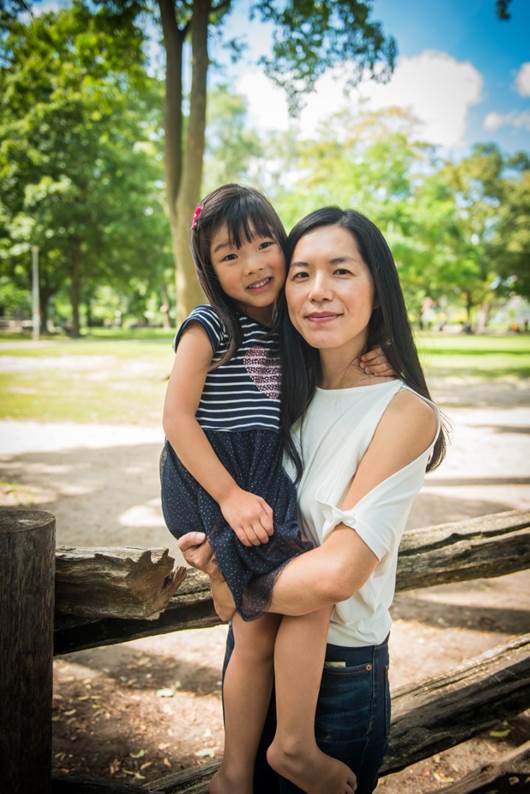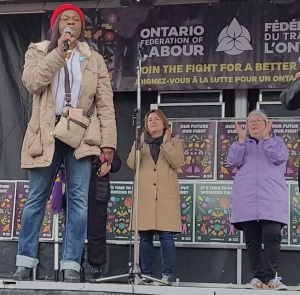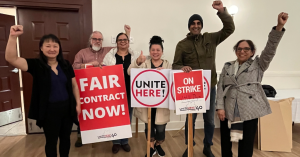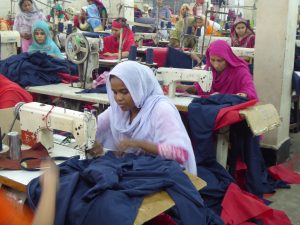劉婉娜對兩個組織工會運動引以自豪

劉婉娜和可愛的女兒。
我的名字是劉婉娜(Anna Liu)作為積極份子已有20多年,目前是國際專業和技術工程師聯合會(IFTPE)的國際代表。我在勞工運動中的工作,主要圍繞組織和教育方面,重點是以工人為中心的參與,社區活動和反壓迫。我擁有勞工研究碩士學位,也是亞裔加拿大勞工聯盟(ACLA)的成員,我最近與黑人工會成員聯盟(CBTU)合作撰寫了一章,內容涉及環境種族主義如何在COVID-19期間,影響工作場所的種族化族群和原住民。
長大後,我對工會知之甚少。在大學的第一年,我選修了一門女性研究課程,它打開了我的眼界,改變了我對生活和周圍世界的看法。同樣的課程也非常重視工會,以及工會如何成為婦女經濟、社會和政治進步的工具。這激勵我主修勞工研究。之後,我開始活躍在校園裡,幫助撰寫時事通訊,支持罷工的助教,並參加了我在約克大學校長辦公室的第一次靜坐。


大約在同一時間,我開始在一家有工會的餐館工作,該餐館的工會是隸屬於聯合食品和商業工人工會(UFCW)。我幾乎馬上就報名成為工會代表。後來,我獲得加拿大勞工議會(CLC)安省辦事處的暑期職位。工會將大量注意力集中在專門的計劃和個人空間上,以增加青年參與勞工運動。我發現自己沉浸在其中,抓住不同的機會更多地了解勞工運動。一路上,我遇到了幾位非凡的活動家,他們給了我指導和鼓勵。他們在維持我對運動的參與和承諾方面發揮了關鍵作用。
在我所做的工作中最引以為豪的勝利,我想到了兩個組織運動。
我第一次成功的組織工會活動是在La Rocca Creative Cake。那裡的工人製作美味的蛋糕,並在各地的超市出售。當我看到他們的蛋糕時,我總是有快樂的感覺。該運動由一群主要是移民和種族化的工人領導。他們果斷且組織良好,這對我作為新手組織者來說是一個真正的祝福。錦上添花的是以壓倒性優勢贏得了選票,並在之後與所有工人舉行了盛大的慶祝活動。
另一個值得驕傲的勝利是安省法律援助處律師運動。這是持續了四年的獨特組織活動,因為律師無法像其他工人有權的根據《安大略省勞資關係法》組建工會。然而,我們找到了一種戰鬥方式,開展公眾壓力運動,並隨後贏得了他們歷史性的集體談判權!這一勝利由國際發展和體面工作中心(ICDD)作為案例研究發表。可以按這裡閱讀。
作為工人和活動家,處理勞工運動中的性別歧視和種族主義一直很困難。我能回憶起的許多經歷令人失望,有時甚至很深刻。然而,我提醒自己,在我之前的活動人士和那些積極挑戰現狀,以打破我們運動內部的結構性和系統性問題的人所奠定的重要基礎。它給了我希望和力量,將這些糟糕的經歷引導到我的組織工作中,以幫助其他可能面臨類似挑戰的工人進行反擊。


作為亞裔加拿大勞工聯盟(ACLA)的成員,我們二十多年來一直致力於加強亞裔工人的聲音。在社區內和勞工之家內,我們發揮多方面的作用,組織起來,在亞裔工人階級社區中與其他社區團結一致,建立力量和空間。亞裔加拿大勞工聯盟有兩個分會:一個在卑詩省,另一個在安省,為加拿大各地的亞裔活動家為建立包容性敘事做出貢獻。
正如我在一篇關於COVID-19和需要團結的文章中提到的那樣,亞裔加拿大勞工聯盟成員認為工會可以做更多的事情來支持亞裔工人、原住民和其他種族化的工人。工會在打擊仇外心理和種族主義方面發揮著至關重要的作用。工會可以在內部採取積極措施來做到這一點,以確保領導者、員工和成員獲得必要的培訓和專業知識,以打擊工作場所和工會中的歧視。已經成立的委員會需要得到充分的支持和資源,因為它們繼續在塑造變革方面發揮關鍵作用。最後,工會還可以加強推動各級政府採取必要措施保護所有工人,無論這些工人是否加入工會。一個典型的例子是繼續向政府施壓,要求進行急需的就業保險改革,以保護最脆弱的群體。
COVID-19大流行極大地影響了原住民和種族化的工人,特別是針對亞裔工人的反亞裔種族主義激增。多倫多警方今年四月公佈的新數據顯示,反亞裔種族主義繼續上升。截至2021年9月,加拿大報告的人均反亞裔種族主義犯罪比美國多100%以上。工會在這裡可以發揮作用,通過支援來自當地和全球各級的亞裔工人來擴大急需的團結,來對抗正在發生的事情。
——————————————————————————————————————-
Anna Liu is proud of the two organizing campaigns
Anna Liu has been an activist for more than 20 years and is currently an International Representative with the International Federation of Professional and Technical Engineers. Her work in the labour movement primarily revolves around organizing and education, focused on worker-centered engagement, community activism, and anti-oppression. Anna holds a MA in Labour Studies. As a member of the Asian Canadian Labour Alliance (ACLA), she recently co-authored a chapter in partnership with the Coalition Black Trade Unionists (CBTU) on how environmental racism impacts Racialized and Indigenous people in the workplace during COVID-19.
Q1: How and why did you get involved in the labour movement?
Growing up, I knew little about unions. In my first year of university, I took a women’s studies course and it opened my eyes, changing my perspective on life and the world around me. The same course also placed a lot of emphasis on unions and how they can be a vehicle for women’s economic, social, and political advancement. This inspired me to major in labour studies. Afterwards, I became active on campus helping to write newsletters, supporting striking Teaching Assistants, and participated in my first sit-in at the York University’s President’s office.
Around the same time, I started working at a restaurant unionized by UFCW. I signed up to be a shop steward almost right away. Later, I took a summer position working out of the CLC Ontario Region office. Unions were focusing a lot of attention on increasing youth involvement in labour with dedicated programs and spaces. I found myself immersed, taking in different opportunities to learn more about the labour movement. Along the way, I met several extraordinary activists who gave me guidance and encouragement. They have been pivotal in sustaining my involvement and commitment to the movement.
Q2: What are you proudest of in the work that you do and/or what has been your proudest win?
There are two organizing campaigns that come to mind.
One of my first successful organizing drives was at La Rocca Creative Cakes. The workers there make delicious cakes and they are sold in supermarkets everywhere. I always have happy thoughts when I see their cakes. The campaign was led by a group of predominantly immigrant and racialized workers. They were decisive and well organized which was a real blessing for me as a newbie organizer. The icing on the cake was winning the vote by a landslide and holding a big celebration afterwards with all the workers.
Another proud win is the Legal Aid Ontario Lawyers campaign. It was an unique organizing drive that lasted four years because lawyers are unable to form a union under the Ontario Labour Relations Act like other workers have the right to. However, we found a way to fight by developing a public pressure campaign and subsequently won their historic collective bargaining rights! This victory was published as a case study by the International Center for Development and Decent Work and can be found here: https://kobra.uni-kassel.de/handle/123456789/11625
Q3: What are some of the biggest challenges you have faced, both in the workplace and as an activist?
Dealing with sexism and racism in the labour movement as a worker and activist has been difficult. There are many experiences I can recall that were disappointing, at times cutting deep. However, I remind myself of the important groundwork laid by activists who came before me and those who are actively challenging the status quo to break down the structural and systemic problems within our movement. It gives me hope and the strength to channel those bad experiences into my organizing work to help other workers who may face similar challenges to fight back.
Q4: What do unions need to do to ensure that Asian workers are better represented and supported as workers, as union members and as leaders?
As a member of the Asian Canadian Labour Alliance (ACLA), we have been working for over two decades to strengthen the voices of Asian workers. Within the community and inside the house of labour, we play a multifaceted role organizing to build power and space amongst Asian working-class communities in solidarity with other communities. ACLA has two chapters: one in British Columbia and another in Ontario with Asian activists across Canada contributing to building a narrative of inclusiveness.
As mentioned in an article I contributed to about COVID-19 and the Need for Solidarity, ACLA members believe unions can be doing more to support Asian workers, as well as Indigenous and other racialized workers. Unions play a vital role in countering xenophobia and racism. Unions can do this by taking proactive measures internally to ensure leaders, staff and members have the necessary training and know-how to combat discrimination in the workplace and union. Constituency committees that have been set up need to be adequately supported and resourced as they continue to play a key role in shaping change. Finally, unions can also reinforce the push for all levels of government to take necessary steps to protect all workers, whether those workers are unionized or not. A prime example is continuing to pressure government for much needed employment insurance reforms to protect the most vulnerable.
The COVID-19 pandemic has drastically impacted Indigenous and racialized workers, especially Asian workers with a surge in anti-Asian racism. New data released by the Toronto police in April this year revealed that anti-Asian racism continues to rise. As of Sept 2021, Canada had more reported anti-Asian racism crimes per capita than the United States by over 100%. Unions have a role here to combat what’s happening by extending much needed solidarity by supporting Asian workers from all ranks locally and globally.







